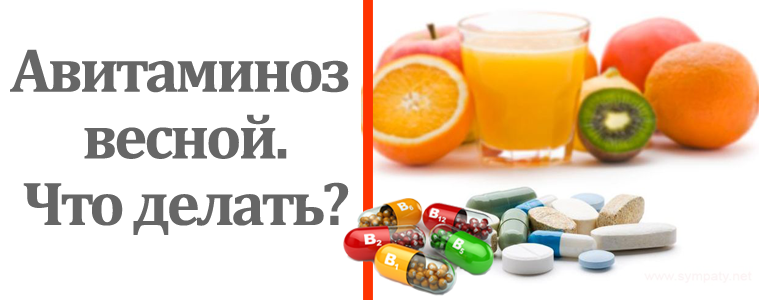Avitaminosis in the spring. What to do?
Spring is the most romantic time, when everything awakens and as if comes to life, at this time of year feelings are aggravated, and, unfortunately, the satellite of spring is avitaminosis, which is expressed in a feeling of constant fatigue and frustration. The situation when there is no vitamin in the body completely does not occur, but often there is a shortage of one or the other vitamin.
Why does avitaminosis occur in the spring?
The most important factor of avitaminosis in spring is that all fruits and vegetables from which a person receives the bulk of minerals, as a result of long-term storage, lose a huge amount of their nutrients by spring.
In some cases, the body is unable to absorb the incoming vitamins, in whole or in part, due to the presence of any diseases, which may include, for example, diseases of the digestive system, lack of enzymes, dysbiosis or parasitic diseases.
People who require increased nutrition, for example, athletes, women during critical days, pregnant women, nursing mothers, and so on, are also prone to spring avitaminosis.
Signs of spring avitaminosis
Symptoms of the manifestation of a disease depend on the deficiency of what vitamin exists in the body.
For example, vitamin A deficiency manifests itself in the hands in the form of peeling and dry skin, while eyesight, blush and tear of the eyes, appetite, general fatigue, hair and nails become brittle may deteriorate.
If a person experiences a shortage of B vitamins, the initial signs of spring nedomaganiya can be expressed in the occurrence of nausea and constipation. If you do not start timely treatment, then in the future there may be irritability, headaches and memory loss. The lack of vitamins of this group in the body of pregnant women can lead to a slowdown in the development of the fetus.
Avitaminosis in adolescents and children, expressed in a lack of vitamin B3 or pantothenic acid, is expressed in a delay in their growth and a sharp increase in body weight.
In this case, blood pressure may decrease, and the functions of the nervous and respiratory systems may be disrupted. At this time of year, people become not only irritable, some are deteriorating mental activity and there is drowsiness, which can be very difficult to cope with.
All of this is also a sign of spring vitamin deficiency and is characteristic of a lack of B6.
In case of B12 deficiency, it is possible to develop diarrhea and various neurological syndromes.
The lack of vitamin C contributes to reducing the body’s resistance to viral infections, the permeability of the vessel walls, the gingival hemorrhage and pains in the lower limbs.
Lack of nicotinic acid or vitamin PP leads to a disruption in the metabolism and other functions of the endocrine system.
For children, it is very important to receive vitamin D and calcium in the optimal amount, since their deficiency provokes the development of such a disease as rickets.
How to carry out prevention?
In order to prevent avitaminosis in the spring, you need to consume an increased amount of nutrients. And here there are two ways: taking special medications, or eating foods rich in the necessary vitamins in this case.
The latter case is applicable only when the body is healthy and is able to fully absorb the substances entering into it. In other cases, you will need the help of a doctor who will determine which minerals in spring vitamin deficiency should be consumed by a particular person.
A large amount of vitamin A contains oil of animal origin, in the liver, as well as vegetables and fruits, yellow and red.
Sour-milk products, cereals and peas are rich in vitamin B1.
Milk and dairy products, meat, offal, buckwheat and oatmeal, as well as legumes will help to fill the deficiency of vitamin B2.
Vitamin B6 is fish, chicken and beef, beans, nuts, as well as vegetables such as potatoes and sweet peppers.
Deficiency of vitamin B12 can be replenished from fatty fish, meat and offal.
A large amount of vitamin C is in black currant, dog rose, sea-buckthorn, citrus, onion, green peas and apples. Strange as it may seem, another vegetable rich in this substance is potatoes.
Carry out prophylaxis of vitamin deficiency in children and to fill the deficiency of vitamin D will help eggs, cod liver, fatty fish and butter.
Support the endocrine system and fully provide the body with nicotinic acid with the help of dairy products, fish, meat and yeast.







